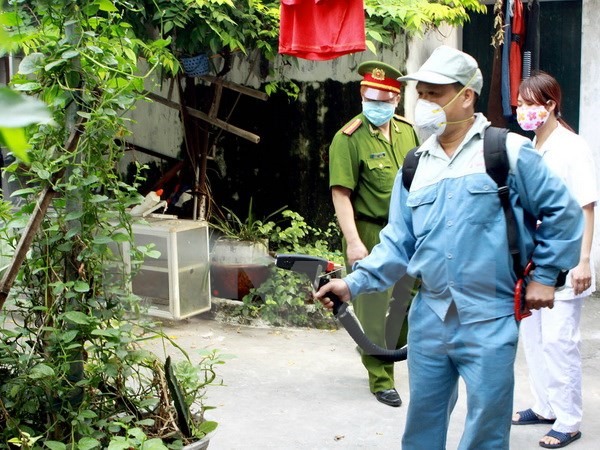 Society
Society

Around 130 experts from Việt Nam, Thailand, Laos and Cambodia met in Hà Nội on Monday to discuss strategies to tackle dengue and other Aedes mosquito-transmitted diseases in ASEAN region.
 |
| A health worker sprays chemicals to kill mosquitoes at a residential area in Trương Định Ward, Hoàng Mai District in Hà Nội. — VNA/VNS Photo Dương Ngọc |
HÀ NỘI — Around 130 experts from Việt Nam, Thailand, Laos and Cambodia met in Hà Nội on Monday to discuss strategies to tackle dengue and other Aedes mosquito-transmitted diseases in ASEAN region.
The two-day symposium on integrated arboviral disease management, prevention and control is a collaborative initiative between the National Institute of Hygiene and Epidemiology and the International Development Research Centre (IDRC), organised to mark ASEAN Dengue Day on June 15.
“Việt Nam and other Southeast Asian nations such as Thailand, Laos and Cambodia are tropical countries in the endemic region of many dangerous arbovirus diseases, including Aedes mosquito-borne diseases like Dengue Haemorrhagic Fever (DHF), Zika and Chikungunya,” Deputy Minister of Health Nguyễn Thanh Long said at the event.
“The World Health Organisation states that Aedes mosquito-borne diseases are difficult to prevent and cannot be isolated by national borders. No single member of ASEAN can implement effective and radical solutions to prevent these diseases without comprehensive collaboration,” Long said.
Arlyne Beeche, IDRC’s senior programme officer, said the IDRC committed to exploring innovation and supporting researchers to apply new knowledge so as to improve public health. “Effective integrated interventions can be cost beneficial, as long as the public is aware and engaged. We need to improve our understanding of the synergistic impact of integrating current and new technologies,” Beeche said.
During the two-day event, participants will discuss related to: diagnosis and treatment; vector monitoring and prevention; viral and vaccine studies for the community; and sustainable cooperation among nations and international organisations.
The experts will also share experiences, make nation-level recommendations, and propose solutions to address the existing challenges in preventing DHF, Zika and Chikungunya in the region.
The symposium’s recommendations will lay the foundation in developing sustainable and effective activities to prevent DHF, Zika and Chikungunya in the future.
DHF is one of the fastest growing infectious diseases in the world, the WHO said. So far, there is no specific medicine to treat DHF. Around 2.5 billion people, or 40 per cent, of the world population are at the risk of getting dengue fever. Of this, 1.8 billion are in Asia Pacific. Việt Nam and other ASEAN countries are among the worst affected by DHF.
Zika, another disease spread by Aedes mosquitoes, caused a global public health emergency in 2016. It has spread rapidly across the world, and till date, 82 countries and territories have recorded the spread and transmission of the Zika virus. Thirteen countries have reported evidence of human-to-human transmission.
In Việt Nam last year, 219 Zika virus cases were reported, including a microcephaly case with suspected association to the virus. — VNS




